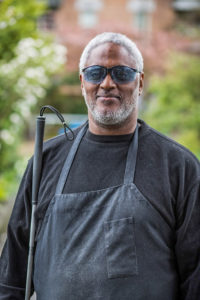John Simms
Wings
By Linda Norlen

John Simms first came to the Lighthouse in 1991, at the age of 22. He has worked operating and setting up machines in the aerospace division for the past nine years.
Born blind, John was one of six children adopted by a couple in Tacoma who were in their early sixties when he arrived. They already had four older children and a girl just 11 months older than he. His adopted mother was a preacher and her congregation prayed for him. At five months old, he got his sight back. Some of these things he’s only now finding out about years later.
He had sight in both eyes when he started school, just wearing glasses. However, several things happened to him and his family while he was young. When John was eight and picking berries, a thorn accidentally went into his left eye; the eye became infected and was removed. When John was 12, a punch in the eye from some boys he fought with at school damaged the tissue in his remaining eye. He still had sight for a brief period; then he was blind. He didn’t tell his parents immediately and was able to fool them for about a week and a half, but his mother took him to the doctor and the truth came out.
Other than the year he lost his vision when he was tutored at home, John was “mainstreamed” in school, and in 8th grade had a braille tutor three times a week and a mobility instructor twice a week. He adapted quickly. “I would never sit in a corner and say ‘woe is me.’” He rode bikes, had summer jobs as a teenager, and participated in wrestling in high school.
When he was 14, John’s father died. His mother was protective of him, as always, but he wanted to study broadcasting at Bates Technical College, which then had a radio program. He got his mobility instructor to show him how to get there on the bus, so that when he announced to his mother that he was going to attend the school, he already knew how to get there. She passed away eight months after his graduation.
After his studied at Bates, he worked as a DJ and threw house parties on the weekend. Yet, he desired to get a steady job and it was his counselor at the Department of Services for the Blind who told him about the Lighthouse.
John says that when he started at the Lighthouse “it was a different world” for him. For one thing, the machines made the workplace very loud, which he wasn’t accustomed to. For another, this was the first time he’d been around other blind people, and it took time for him to get used to not being the only one, as he had been in every school he attended. “Now other people had swinging canes, too,” he says. The majority of his co-workers were in the same predicament as he; they had much in common and swapped stories about how life had treated them.
For John, a high point at work was when he first started as an operator and got a buy-off, confirmation that he had made something that someone else could use. Even though he has only flown in an airplane twice in his life, John is happy that the parts he makes for planes help other people to fly. “When they say ‘your part is good,’ that puts a smile on my face.”
One of the people at the Lighthouse who inspired him, John says, was Harold Martinson, whom everyone called “Pops.” Martinson has since passed away, but John remembers him as “one of the coolest guys, very knowledgeable, very approachable. He was one of the first setup and leads who was blind.”
John says the Lighthouse is one of the first places he’d ever been where people didn’t care about a person’s color. “I myself don’t care about color,” he says; after all, “everyone looks black to me!”
John says he is very careful on the job and always approaches the open-faced mills he operates with caution. One of the biggest changes he’s experienced at the Lighthouse, besides the different kinds of equipment that have come and gone, is the way the company has increasingly trusted people who are blind to do their own setting up and running of equipment. John says that gave him a boost and made him want to spread his wings even more.
John says his mother used to tell his older brother to watch out for John. “When I got the job at the Lighthouse, I told him I can watch out for myself now.” John feels it’s a kind of dedication to his mom that he’s self-sufficient and carrying his own weight. He’s thankful for all of that.